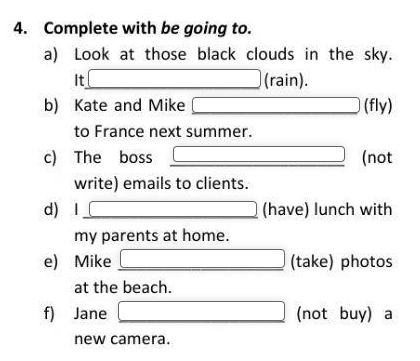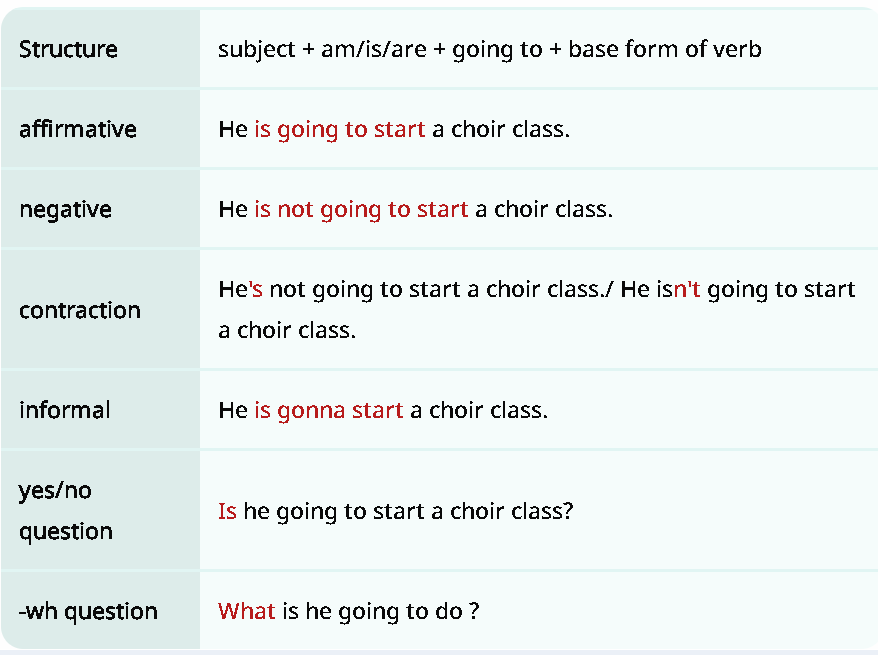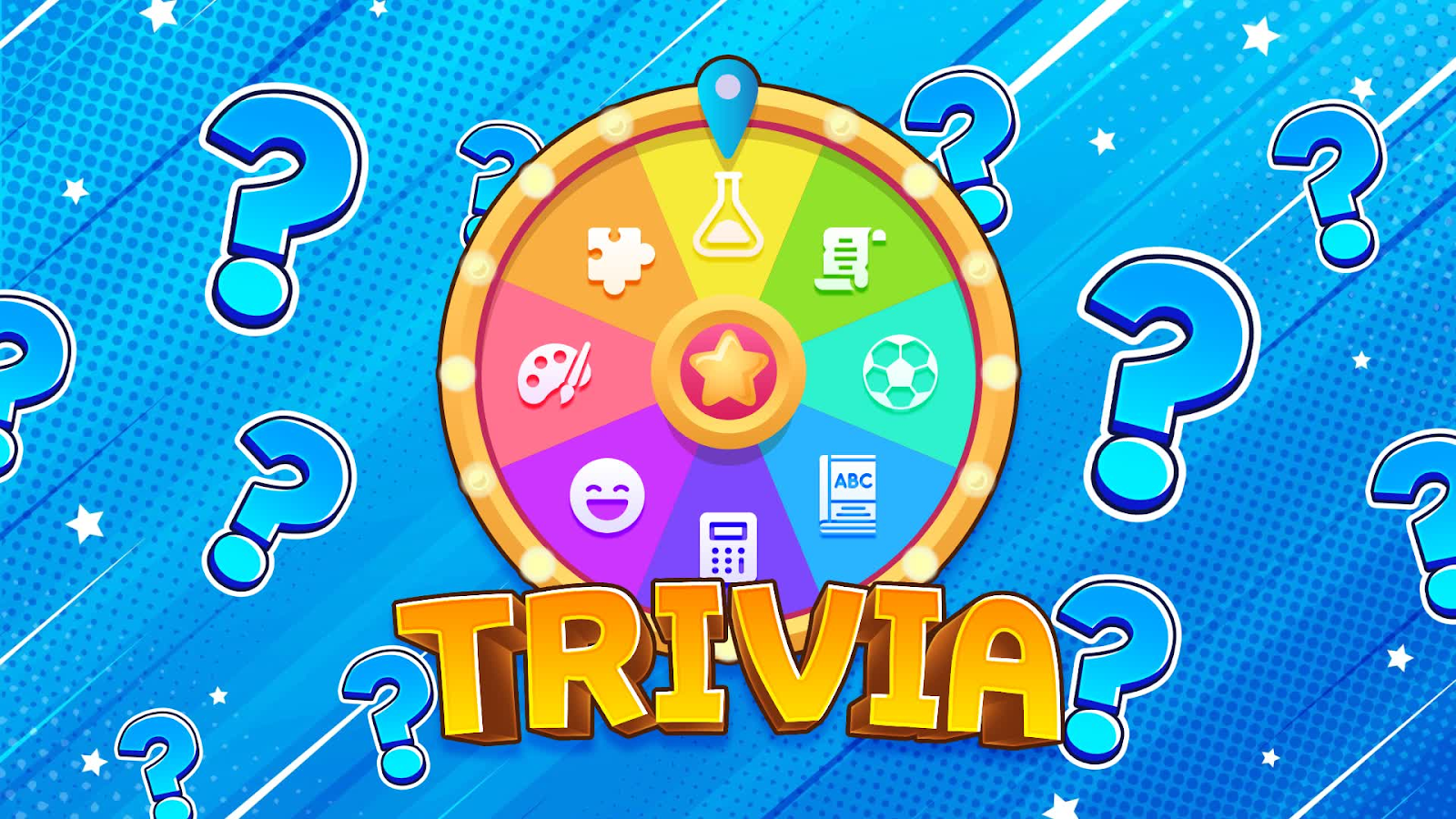jueves, 29 de agosto de 2024
FUTURE (PRACTICE)
martes, 27 de agosto de 2024
FUTURE: WILL -BE GOING TO
Today we are going to finish the activities we started the last class.
WARM UP: Students 11th grade.
1. Define the future.
2. What are the auxiliaries that you use for future?
3. Online practice / write the sentences on your notebook:
https://wordwall.net/es-us/community/future-simple-game
4. Students are going to be in pairs, they are going to make predictions about each other.
5. English day
FUTURE: WILL - GOING TO
Today we are going to finish the activities we started the last class.
1. Define the future.
2. What are the auxiliaries that you use for future?
3. Online practice / write the sentences on your notebook:
https://wordwall.net/es-us/community/future-simple-game
4. Students are going to be in pairs, they are going to make predictions about each other.
5. English day
FUTURE
Today we are going to finish the activities we started the last class.
1. Define the future.
2. What are the auxiliaries that you use for future?
3. Online practice / write the sentences on your notebook:
https://wordwall.net/es-us/community/future-simple-game
4. Students are going to be in pairs, they are going to make predictions about each other.
LIKES AND DISLIKE
IMPERTIVE VERBS
viernes, 23 de agosto de 2024
Bingo
jueves, 22 de agosto de 2024
FUTURE - WILL - BE GOING TO
miércoles, 21 de agosto de 2024
Reading comprehension
martes, 20 de agosto de 2024
MATERIAL


5 DE SEPTIEMBRE (ENGLISH DAY)
ENGLISH DAY
1. STUDENTS ARE GOING TO REVIEW SOME VOCABULARY AND THEN THEY ARE GOING TO PRACTICE THE SONG FOR THE ENGLISH DAY.
CONTINUACIÓN
ENGLISH DAY
Likes and dislikes
Mis niños hermosos, el día de hoy aprenderemos un nuevo tema.
Hoy aprenderemos sobre a decir las cosas que nos gustan en inglés utilizando esto: "like and dislike"
Escucha con atención la explicación de la profe. 👀👂
Hagamos juntos el siguiente juego.
Escribe en tu cuaderno. 📖
Like and don´tlike
Cuando quieres expresar tus gustos y preferencias en inglés, puedes utilizar "like" y "dislike" seguidos de un verbo en infinitivo. Por ejemplo: - I like to read books. (Me gusta leer libros) - She doesn´t like playing soccer. (A ella no le gusta jugar al fútbol) - They like to travel. (A ellos les gusta viajar).
Actividad práctica.
Realiza las siguientes páginas:
Firts grade: 220
Second grade:252
Third grade: 328
martes, 13 de agosto de 2024
PRACTICE

ON YOUR NOTEBOOK:
A.Choose the correct option to complete each sentence. Discuss your answers with a partner.
1. Present Simple vs. Past Simple
My brother ____ (to play) soccer every weekend.
a) plays
b) played
2.Present Perfect
She ____ (to visit) Paris three times.
a) has visited
b) visited
3. Present Simple vs. Present Perfect
I ____ (to read) this book last year.
a) read
b) have read
4.Should vs. Must
You ____ finish your homework before you go out.
a) should
b) must
5.Present Simple vs. Past Simple
They ____ (to eat) dinner at 7 PM yesterday.
a) eat
b) ate
6.Present Perfect
He ____ (to not see) that movie yet.
a) has not seen
b) did not see
7.Should vs. Must
You ____ wear a helmet when riding a bike for safety.
a) should
b) must
8.Present Simple vs. Present Perfect
I ____ (to live) in this town for five years.
a) live
b) have lived
9.Past Simple
We ____ (to go) to the museum last weekend.
a) go
b) went
10.Present Simple
She ____ (to like) chocolate.
a) likes
b) liked
My sister usually ____ (to study) in the evening.
a) studies
b) studied
12.Past Simple
Last summer, we ____ (to visit) our grandparents.
a) visit
b) visited
13.Present Perfect
They ____ (to finish) their project already.
a) have finished
b) finished
14.Present Simple vs. Past Simple
She ____ (to take) the bus to school every day when she was younger.
a) takes
b) took
15.Should vs. Must
You ____ eat more vegetables to stay healthy.
a) should
b) must
16.Present Perfect
I ____ (to hear) that song before.
a) have heard
b) heard
17.Present Simple
The sun ____ (to rise) in the east.
a) rises
b) rose
18.Past Simple
He ____ (to break) his leg while skiing last winter.
a) breaks
b) broke
19.Present Perfect
We ____ (to not finish) our homework yet.
a) have not finished
b) did not finish
20.Should vs. Must
You ____ see a doctor if you're feeling sick.
a) should
b) must
21.Present Simple
Cats ____ (to like) to sleep a lot.
a) like
b) liked
22.Past Simple
They ____ (to have) a great time at the party.
a) have
b) had
23.Present Perfect
She ____ (to live) in three different countries.
a) has lived
b) lived
24.Present Simple vs. Present Perfect
I ____ (to see) that movie last night.
a) see
b) saw
25.Should vs. Must
Students ____ arrive on time for their exams.
a) should
b) must
26.Past Simple
We ____ (to cook) dinner together last night.
a) cook
b) cooked
27.Present Simple
She always ____ (to read) before bed.
a) reads
b) read
28.Present Perfect
They ____ (to know) each other for years.
a) have known
b) knew
29.Present Simple vs. Past Simple
He ____ (to visit) the zoo every summer when he was a kid.
a) visits
b) visited
30.Should vs. Must
You ____ follow the safety instructions at the workshop.
a) should
b) must
B: Each group will choose or be assigned a prompt and create sentences or short dialogues using the appropriate tenses and modals. After creating their sentences, groups will present their work to the class.
Daily Routines - Recent events - Past events - Advice for healthy living.
C. SOCIALIZE
Commands /imperatives
Can/can´t
can/can´t.
jueves, 8 de agosto de 2024
CONTINUACIÓN SHOULD AND MUST
GOOD MORNING MY DEAR STUDENTS. TODAY WE ARE GOING TO CONTINUE WORKING ON SHOULD.
2. Advice Column Creation:
- Activity: Have students create an advice column for a fictional magazine. They need to address common teenage issues (like managing stress or dealing with peer pressure) and use "should" and "must" to offer solutions.
martes, 6 de agosto de 2024
ICFES EXERCISE
GOOD MORNING MY DEAR STUDENTS. TODAY WE ARE GOING TO PRACTICE A LITTLE BIT
MATERIAL DE APOYO
Conoce el formato: Familiarízate con el tipo de preguntas que suelen aparecer en el examen. Usualmente incluyen comprensión de lectura, vocabulario y gramática. Practicar con exámenes anteriores o simulacros puede ser útil.
Mejora tu vocabulario: Amplía tu conocimiento de palabras y frases comunes en inglés. Puedes usar aplicaciones, leer libros o artículos en inglés, o hacer tarjetas de vocabulario.
Practica la comprensión de lectura: Lee textos en inglés y trata de resumir la idea principal y los detalles importantes. Practica con diferentes tipos de textos, como artículos de noticias, ensayos y relatos.
Refuerza la gramática: Asegúrate de tener claros los tiempos verbales, preposiciones, concordancia de sujeto y verbo, y otros aspectos gramaticales importantes. Hay muchas guías y ejercicios en línea que te pueden ayudar.
Haz ejercicios de práctica: Realiza ejercicios específicos para la prueba de inglés. Busca recursos en línea, libros de preparación para exámenes o aplicaciones diseñadas para practicar inglés.
Desarrolla habilidades de lectura rápida: En la prueba, es importante poder leer y comprender rápidamente. Practica técnicas de lectura rápida y toma notas mientras lees para ayudar a retener la información.
Administra tu tiempo: En el examen, es crucial manejar bien el tiempo. Practica responder preguntas bajo limitaciones de tiempo para acostumbrarte a la presión.
Lee las instrucciones cuidadosamente: Asegúrate de entender lo que se te pide en cada pregunta antes de responder. A veces, los detalles en las instrucciones pueden cambiar el enfoque de cómo deberías responder.
Mantén la calma y la concentración: En el día del examen, trata de estar relajado y concentrado. Respira profundamente y no te pongas demasiado nervioso. La confianza en tus habilidades puede marcar una gran diferencia.






























